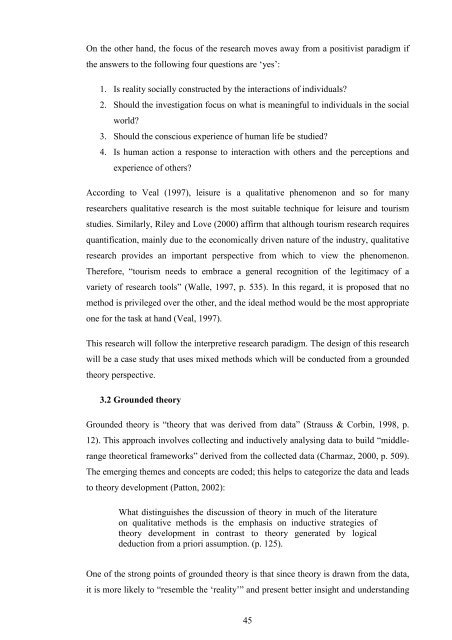The Role of Local Food in Maldives Tourism - Scholarly Commons ...
The Role of Local Food in Maldives Tourism - Scholarly Commons ...
The Role of Local Food in Maldives Tourism - Scholarly Commons ...
You also want an ePaper? Increase the reach of your titles
YUMPU automatically turns print PDFs into web optimized ePapers that Google loves.
On the other hand, the focus <strong>of</strong> the research moves away from a positivist paradigm if<br />
the answers to the follow<strong>in</strong>g four questions are ‘yes’:<br />
1. Is reality socially constructed by the <strong>in</strong>teractions <strong>of</strong> <strong>in</strong>dividuals?<br />
2. Should the <strong>in</strong>vestigation focus on what is mean<strong>in</strong>gful to <strong>in</strong>dividuals <strong>in</strong> the social<br />
world?<br />
3. Should the conscious experience <strong>of</strong> human life be studied?<br />
4. Is human action a response to <strong>in</strong>teraction with others and the perceptions and<br />
experience <strong>of</strong> others?<br />
Accord<strong>in</strong>g to Veal (1997), leisure is a qualitative phenomenon and so for many<br />
researchers qualitative research is the most suitable technique for leisure and tourism<br />
studies. Similarly, Riley and Love (2000) affirm that although tourism research requires<br />
quantification, ma<strong>in</strong>ly due to the economically driven nature <strong>of</strong> the <strong>in</strong>dustry, qualitative<br />
research provides an important perspective from which to view the phenomenon.<br />
<strong>The</strong>refore, “tourism needs to embrace a general recognition <strong>of</strong> the legitimacy <strong>of</strong> a<br />
variety <strong>of</strong> research tools” (Walle, 1997, p. 535). In this regard, it is proposed that no<br />
method is privileged over the other, and the ideal method would be the most appropriate<br />
one for the task at hand (Veal, 1997).<br />
This research will follow the <strong>in</strong>terpretive research paradigm. <strong>The</strong> design <strong>of</strong> this research<br />
will be a case study that uses mixed methods which will be conducted from a grounded<br />
theory perspective.<br />
3.2 Grounded theory<br />
Grounded theory is “theory that was derived from data” (Strauss & Corb<strong>in</strong>, 1998, p.<br />
12). This approach <strong>in</strong>volves collect<strong>in</strong>g and <strong>in</strong>ductively analys<strong>in</strong>g data to build “middle-<br />
range theoretical frameworks” derived from the collected data (Charmaz, 2000, p. 509).<br />
<strong>The</strong> emerg<strong>in</strong>g themes and concepts are coded; this helps to categorize the data and leads<br />
to theory development (Patton, 2002):<br />
What dist<strong>in</strong>guishes the discussion <strong>of</strong> theory <strong>in</strong> much <strong>of</strong> the literature<br />
on qualitative methods is the emphasis on <strong>in</strong>ductive strategies <strong>of</strong><br />
theory development <strong>in</strong> contrast to theory generated by logical<br />
deduction from a priori assumption. (p. 125).<br />
One <strong>of</strong> the strong po<strong>in</strong>ts <strong>of</strong> grounded theory is that s<strong>in</strong>ce theory is drawn from the data,<br />
it is more likely to “resemble the ‘reality’” and present better <strong>in</strong>sight and understand<strong>in</strong>g<br />
45

















